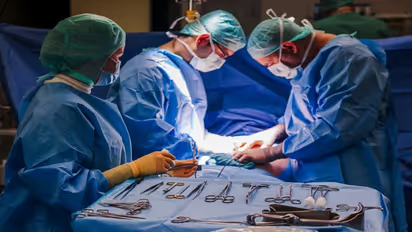Organ transplant patients are inheriting donors’ memories, phobia, personalities, research suggests

Synopsis
People receiving organ transplants have reported strange changes in their emotions, tastes, and memories.
Organ transplant patients are reporting changes in their emotions, preferences, and even memories. These unexpected shifts have sparked intrigue and debate among researchers, especially when heart transplant recipients share uncanny similarities with their donors' personalities or past experiences.
While these phenomena are most frequently observed in heart transplant patients, individuals who have received kidneys, lungs, and even faces have also experienced unexplainable transformations in their taste in food, music, and sometimes even sexual orientation.
In one case, a woman shared that his nine-year-old son who received the heart of a three-year-old girl who tragically drowned experienced an intense and sudden fear of water, a phobia eerily aligned with his donor's death.
In another instance, a college professor who received the heart of a police officer fatally shot in the face began experiencing unsettling visions. "My face gets real, real hot. It actually burns," he described, likening the sensation to the moment his donor faced death.
Researchers are increasingly exploring the possibility of cellular memory transfer—a theory suggesting that individual cells may harbor memories that can be transferred from donor to recipient. This hypothesis challenges traditional beliefs about memory and identity, pointing to the heart's intricate neural network and its deep communication link with the brain.
In their 2024 review, researchers wrote, "Emerging evidence suggests that heart transplantation may involve the transfer of the donor's personality traits and memories to the recipient, challenging conventional views of memory and identity. Additionally, the heart's neural network and bidirectional communication with the brain support the concept of heart-brain connection in memory and personality."
However, the exact mechanisms behind these phenomena remain elusive. Some scientists argue that genetic shifts caused by the introduction of a new organ might lead to these changes. Others propose that psychological factors, such as the trauma of surviving a near-death experience or recovering from life-altering surgery, could explain these altered behaviors.
Medications prescribed post-transplant, such as immunosuppressants, might also play a role, potentially influencing appetite and altering patients’ food preferences. Experts from McGill University in Canada suggest that patients may subconsciously attribute changes to their donor's traits, especially if they enter surgery with preconceived fears about inheriting behaviors.
The anecdotes, however, remain compelling. A health-conscious choreographer suddenly craved Kentucky Fried Chicken after her transplant—a food she never ate before. The connection? Her donor had uneaten chicken nuggets in his jacket at the time of his death.
In another case, a vegetarian donor appeared to have influenced a 29-year-old woman to develop a sudden aversion to meat. More intriguingly, some recipients have reported changes in sexual orientation. A gay man who received a heart from a lesbian artist found himself more attracted to women, while a lesbian woman who received a heterosexual woman’s heart began questioning her sexuality.
While these tales capture public fascination, researchers emphasize the need for rigorous scientific investigation. "Further interdisciplinary research is needed to unravel the intricacies of memory transfer, neuroplasticity, and organ integration," the 2024 review concluded.
Stay updated with the Breaking News Today and Latest News from across India and around the world. Get real-time updates, in-depth analysis, and comprehensive coverage of India News, World News, Indian Defence News, Kerala News, and Karnataka News. From politics to current affairs, follow every major story as it unfolds. Get real-time updates from IMD on major cities weather forecasts, including Rain alerts, Cyclone warnings, and temperature trends. Download the Asianet News Official App from the Android Play Store and iPhone App Store for accurate and timely news updates anytime, anywhere.